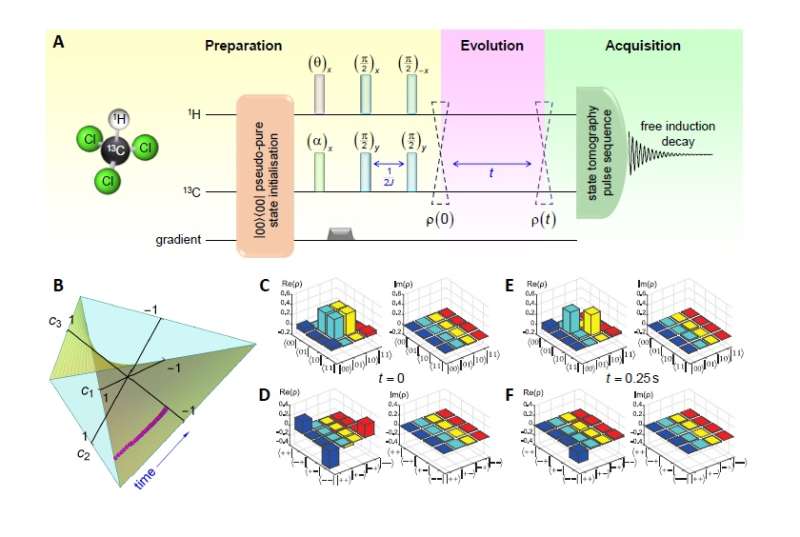October 14, 2016 feature
Forever quantum: physicists demonstrate everlasting quantum coherence

(Phys.org)—Physicists have implemented the first experimental demonstration of everlasting quantum coherence—the phenomenon that occurs when a quantum system exists in a superposition of two or more states at once. Typically, quantum coherence lasts for only a fraction of a second before decoherence destroys the effect due to interactions between the quantum system and its surrounding environment.
The collaboration of physicists, led by Gerardo Adesso at The University of Nottingham and with members from the UK, Brazil, Italy, and Germany, have published a paper on the demonstration of the extreme resilience of quantum coherence in a recent issue of Physical Review Letters.
"Quantum properties can be exploited for disruptive technologies but are typically very fragile," Adesso told Phys.org. "Here we report an experiment which shows for the first time that quantum coherence in a large ensemble of nuclear spins can be naturally preserved ('frozen') under exposure to strong dephasing noise at room temperature, without external control, and for timescales as long as a second and beyond."
Quantum coherence is an inherently quantum property that arises due to the wave-like nature of matter. Most importantly for potential applications, quantum coherence allows a quantum system to occupy a superposition of states. This trait leads to quantum parallelism, which is the key ingredient that allows some quantum devices to outperform classical ones in a wide range of applications. For instance, many research groups are currently working on harnessing quantum coherence to develop quantum algorithms, quantum cryptography, quantum metrology, and other quantum technologies.
However, a major obstacle to developing these technologies is to overcome the fragile, fleeting nature of quantum coherence. While researchers have developed methods to slow down or correct the effects of decoherence, these methods are generally very resource-demanding.
The method presented in the new study does not attempt to slow down or correct decoherence, but instead it reveals a natural mechanism under which resilience to decoherence spontaneously emerges. The results show that, under certain conditions, quantum coherence remains completely unaffected by common mechanisms of decoherence that typically destroy coherence. The new mechanism was predicted to exist in a study published last year by some of the same authors.
In the new study, the researchers have experimentally observed this effect for the first time. The scientists demonstrated the mechanism in composite systems whose subsystems are all affected by decoherence, yet the overall composite system maintains its quantum coherence for as long as desired.
"The trick lies in the fact that local decoherence acts in a preferred direction, which is perpendicular to the one in which coherence is measured," Adesso explained. "Consequently, the resulting quantum states are overall degraded by such noise, but their observed coherence remains unaffected during the dynamics if the initial conditions are suitably chosen."
The researchers implemented the method using set-ups that involve room-temperature liquid-state nuclear magnetic resonance (NMR) quantum simulators, and demonstrated the effect in two- and four-qubit ensembles.
"We used two different NMR set-ups," said first author Isabela Silva, at the University of São Paulo and The University of Nottingham. "The first, owned by Ivan Oliveira's group in Brazil, consisted of a simple chloroform sample labeled with Carbon-13 to encode the two-qubit system in the hydrogen and carbon nuclei. The four-qubit system was instead a heteronuclear sample specially developed in Steffen Glaser's group in Germany. To manipulate this four-channel heteronuclear system independently, a prototype NMR probe head was also developed. Both systems are affected by natural and independent dephasing channels. Therefore, once initial quantum states satisfying special constraints are prepared, the quantum coherence freezing can be automatically observed, with no need for external control."
The researchers predict that the surprising effect can occur in larger systems composed of any even number of qubits. Odd-numbered qubit systems do not exhibit the resilience because the specific initial conditions supporting the phenomenon cannot be met due to the different geometry of quantum states in such instances.
The researchers also showed that the mechanism appears to be universal, since it does not depend on the specific measure used to quantify the amount of coherence. The researchers expect that this trait will make the mechanism especially useful for future applications.
"The universality paves the way toward designing a novel generation of quantum-enhanced devices able to harness coherence for unscathed performance in realistic and adverse conditions," Adesso said.
Besides technological innovations, the results may also shed light on the quantum coherence that occurs naturally in biological systems, such as the light-harvesting systems in plants. Previous research has shown that some biological systems can maintain quantum coherence for very long times in certain noisy environments.
"The new study raises the possibility that these systems may have evolved an ability to harness natural mechanisms for coherence protection, similar to the one reported here," said coauthor Rosario Lo Franco at the University of Palermo in Italy.
More information: Isabela A. Silva et al. "Observation of time-invariant coherence in a room-temperature quantum simulator." Physical Review Letters. DOI: 10.1103/PhysRevLett.117.160402
Also at arXiv:1511.01971 [quant-ph]
Journal information: Physical Review Letters
© 2016 Phys.org





















